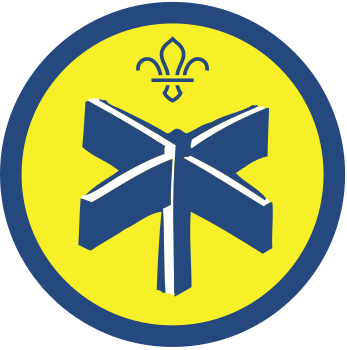Urban spellers
You’ll need
- Camera or phone
- Scissors
- Glue sticks
- A4 paper
- Printer
Before you begin
- Involve the group in deciding where to go; they may be eager to visit a specific type of place.
- Don’t forget to do a risk assessment, and invite parents and carers (and Young Leaders) to come with you.
Get ready to spot
- Everyone should split into small groups. The person leading the activity should make sure that each small group has an adult and a camera (or smartphone).
- The person leading the activity should give each group a word. They could use the word Scouts.
- Each group should make sure they know the letters in the word they’ve been given. They should think about where they may be able to see the letters that make up their world in their town. They could think about shop signs, road signs, or road names.
- Everyone should travel safely to the town.
Spot
- Each group should stay with their adult as they enjoy exploring the town and finding the letters in their word.
- Groups should look up high and down low to make sure they spot any signs or posters with letters on.
- When a group finds a letter in their word, they should take a close-up picture of it. They should make sure the picture’s in focus, and everyone should take it in turns to have a turn at taking the photos.
- If a group’s really struggling to find a tricky letter, the adult with them may say they can make a letter with their bodies.
- Everyone should gather back together at the agreed place and time.
Share the spots
- Everyone should print out the letters, trim them with scissors if they need to, and stick them onto a bit of paper to make their word.
- Everyone should admire everyone’s work. Did different groups find different things?
Reflection
This activity was a chance to try new things by exploring a familiar area in a different way. Did anyone discover anything new about the town by looking so carefully? How did it feel to look at signs and shops in a different way?
This activity also needed everyone to be a team player. Everyone should look at the word their team created. Where did everyone find the letters? Were some letters easier or harder to find? Which ones? Did anyone have any disagreements during their visit? How did they solve them?
Safety
All activities must be safely managed. You must complete a thorough risk assessment and take appropriate steps to reduce risk. Use the safety checklist to help you plan and risk assess your activity. Always get approval for the activity, and have suitable supervision and an InTouch process.
- Outdoor activities
You must have permission to use the location. Always check the weather forecast, and inform parents and carers of any change in venue.
- Scissors
Supervise young people appropriately when they’re using scissors. Store all sharp objects securely, out of the reach of young people.
- Glue and solvents
Always supervise young people appropriately when they’re using glue and solvent products. Make sure there’s plenty of ventilation. Be aware of any medical conditions that could be affected by glue or solvent use and make adjustments as needed.
- Phones and cameras
Make sure parents and carers are aware and have given consent for photography.
Add an extra word. You could challenge groups to search for letters that make up their favourite game and activity, such as camping, cooking, or singing.
Make sure the area you’re visiting is accessible for everyone. Use descriptions and prompt pictures where they’re needed.
All Scout activities should be inclusive and accessible.
You could take photographs of unusual buildings (or from unusual angles) as part of the Photographer Activity Badge. You could also invite a local community member who works in the town (such as a police officer or councillor) to talk about how they keep the town you’ve explored safe for the people who live, work, and visit there. This would also count towards the My World Challenge Award.
